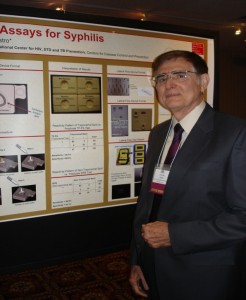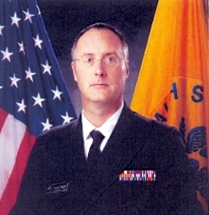Categories: Disease Outbreaks, Emergency Response
October 24th, 2012 11:44 am ET -
Blog Admin
 The CDC lab has identified Exserohilum (pictured above) as the primary fungus responsible for the current meningitis outbreak. Photo courtesy of the CDC Public Health Image Library.
The CDC lab has identified Exserohilum (pictured above) as the primary fungus responsible for the current meningitis outbreak. Photo courtesy of the CDC Public Health Image Library.
1. WHAT’S GOING ON?
- As of October 23, 2012, 204 cases, including 23 deaths, of fungal meningitis have been reported in 17 states (see case count map). Four cases of joint infections have also been reported.
- The meningitis and infections have been linked to three lots (i.e. batches) of an injectable steroid medication produced by New England Compounding Company (NECC) (see health care facilities map).
- The implicated lots of medication have been recalled; however, approx. 14,000 people may have been exposed to the contaminated injectable steroid medication.
- The medication in question differs from the epidural given to pregnant women during childbirth.
- For more information, visit CDC’s Current Situation webpage.
MORE >>
 6 Comments -
Read more
6 Comments -
Read more

Categories: Disease Detectives
September 6th, 2012 11:39 am ET -
Curt Shannon

We welcome guest blogger Dr. Douglas H. Hamilton, director of the Epidemic Intelligence Service (EIS) at CDC.
There are times when many outbreaks hit all at once. CDC disease detectives are working in communities and responding to outbreaks of hantavirus in California; a bad West Nile Virus season; Salmonella food contamination in cantaloupes and now mangoes; Legionnaires’ disease in Chicago; H3N2 virus in pigs; and plague in Colorado. This is a summer blockbuster of outbreaks – from some diseases that are seasonal and some that are pretty rare.
MORE >>
 Post a Comment -
Read more
Post a Comment -
Read more

Categories: Uncategorized
May 24th, 2012 4:28 pm ET -
Curt Shannon
Dr. Cara Burns is team lead of the Polio Molecular Epidemiology Laboratory, Polio and Picornavirus Laboratory Branch, Division of Viral Diseases, National Center for Immunization and Respiratory Disease at CDC. We asked her about her work:
What do you do at CDC?
As a research microbiologist, I lead a team of scientists who support the worldwide polio eradication program by sequencing viral genes and tracking polioviruses as they spread. We can determine if polioviruses have been imported from one country to another. We can also figure out where children are being missed by the immunization teams, by combining the sequencing information with information about where and when people are paralyzed by polio. This combined approach is called molecular epidemiology, which is an important part of the Global Polio Eradication Initiative. CDC works with other major partners such as the World Health Organization, the Bill and Melinda Gates Foundation, UNICEF and Rotary International.
MORE >>
 Post a Comment -
Read more
Post a Comment -
Read more

Categories: Uncategorized
March 20th, 2012 1:56 pm ET -
Curt Shannon

Dr. Arnold Castro has developed innovative tests to more quickly diagnose syphilis. As a result, patients may begin receiving treatment sooner.
Editor’s Note: Dr. Arnold received this honor from the Laboratory Science, Policy and Practice Program Office (LSPPPO) in the Office of Surveillance, Epidemiology, and Laboratory Services (OSELS) at CDC. We asked Dr. Castro some questions about his work:
What do you do at CDC?
I am a research microbiologist and I am responsible for the development of new innovative point of care (POC) rapid tests for the diagnosis of syphilis using serum, plasma or whole blood. The test is simple, inexpensive, requires no expertise to interpret the results and it is capable of determining the serological status of a patient by screening and confirming the result in a single test within 2 to 15 minutes while the patient waits at the clinical site. I also have other duties related to syphilis detection, including serving as technical advisor for the WHO syphilis Proficiency Testing Program at CDC.
 2 Comments -
Read more
2 Comments -
Read more

Categories: Uncategorized
January 27th, 2012 2:54 pm ET -
Curt Shannon

Dr. S. Patrick Kachur grew up on Ohio’s Mosquito Lake. He trained in preventive medicine and public health and has worked on malaria at CDC since 1995.
Meet Dr. S. Patrick Kachur, who oversees CDC’s Malaria Branch. Not only is the Malaria Branch the oldest program at CDC but with more than 60 staff, it’s the largest group of malaria scientists in North America. We recently talked to Dr. Kachur about his work.
What personal experience in your work are you proudest of?
I was fortunate to work with Kenyan and Tanzanian scientists on studies that proved how treated bednets and new combination medicines save lives–even in the remote communities hardest hit by malaria.
How does your work save lives and protect people?
Scientists in CDC’s Malaria Branch help set global and national policies to scale up malaria prevention and treatment. As a result of CDC’s work, and the efforts of many of our partners, the number of deaths from malaria has fallen from more than 1.5 million to 655,000 in less than ten years.
What is the biggest barrier you face in doing your work?
Even though we have seen tremendous progress in combating malaria in recent years, this could unravel if political will and financial support fall off. Malaria parasites and the mosquitoes that carry them are constantly adapting and we need to continue our current interventions as well as advance the science that will lead to new tools like the RTS,S vaccine.
What is the most important thing for the public to know about what you do?
CDC started the fight against malaria. Now let’s finish it together.
You can read more about Dr. Kachur and CDC’s malaria team in the CDC Works For You 24/7 article, Malaria Vaccine Trial: Behind the Scenes in Kenya, which describes CDC/Kenya Medical Research Institute’s participation in the RTS,S malaria vaccine Phase III clinical trial.
 3 Comments -
Read more
3 Comments -
Read more

 The CDC lab has identified Exserohilum (pictured above) as the primary fungus responsible for the current meningitis outbreak. Photo courtesy of the CDC Public Health Image Library.
The CDC lab has identified Exserohilum (pictured above) as the primary fungus responsible for the current meningitis outbreak. Photo courtesy of the CDC Public Health Image Library.





